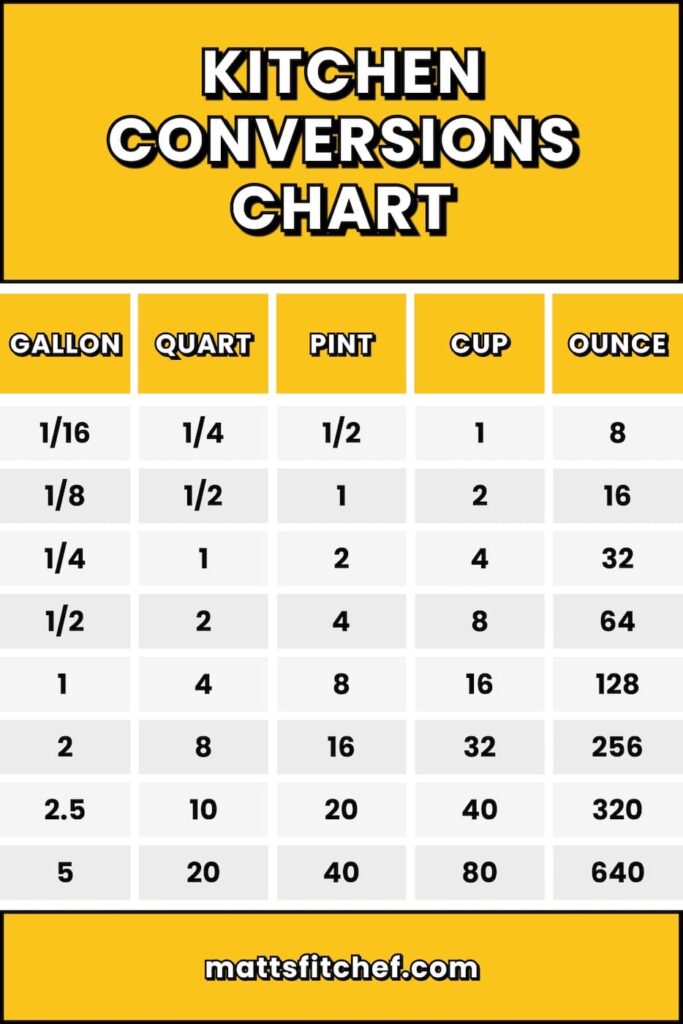1 gallon equals 16 cups.
Maybe you're wondering how many cups in a gallon of water, or maybe you want to know how many cups in a half gallon of milk. Stick around because in this blog post we are going to learn everything about cups and gallons.

The conversion chart up here is a quick and easy way to remember the cups to gallons relation. The huge G stands for Gallon, the Qs stand for Quarts, the Ps stand for Pints, and the Cs stand for Cups. As we can clearly see, one G contains 4 Qs, 8 Ps and 16 Cs. This being said:
- There are 16 cups in one gallon
- There are 8 cups in half gallon
The difference between imperial and metric measurements
The Imperial Measurement System is the standard system in the United States, while the Metric System is used in most other countries of the world. The main difference between the two is the units they use and how they're scaled. While in the metric system people measure in grams and liters, in the US you'll be using ounces, cups and gallons.
Funny enough, the Imperial System did not originate in the States! In fact, it has its roots in ancient Rome, when the Romans used to count in ½s, ¼s, ⅛s etc. For instance, the term "Gallon" comes from the Latin "Galum", a way of measuring wine! The Imperial System was later adopted by the British, who then colonized America. While in 1965 the British Imperial System left its place to the Metric System in the UK, gallons and cups are still used nowadays in the United States.
Liquid gallons or dry gallons?
There is an important distinction to make, when addressing the question "How many cups in a gallon ?". At the very beginning we have learnt that there are 16 cups in one gallon. But in reality, the 1 gallon to cup ratio will slightly change if we are measuring dry or liquid items. Well, this makes a lot of sense. One cup of flour has a different density, volume and thus weight than a cup of water.
There are 16 cups in a gallon of liquids. But when measuring dry ingredients, there are 18.62 cups in a gallon.
How many cups in one gallon ?
There are 16 cups in a gallon of liquid ingredients. This is equal to 128 ounces. For example, imagine pouring a gallon of milk into cups. You'll end up with 16 cups full of milk, all containing the same amount. If we are measuring dry goods instead, one gallon equals 18.62 cups.
How many cups in a half gallon ?
There are 8 cups in half gallon, or 64 ounces, provided that we're measuring liquids. The math is simple here, just divide the 1 gallon cup amount up here (16) by 2 and you'll get 8. If considering dry ingredients, half gallon is 9.31 cups.
How many cups in a quart ?
There are 4 cups in a quart of liquid ingredients, and 4.66 cups in a quart of dry ingredients. Think about the previous chart with the huge G and you'll quickly recall that one Q contains 4 Cs. This will make it easy to remember how many cups in a quart.
How many cups in a pint ?
There are 2 cups in a pint of liquids, or 2.32 cups if we are measuring dry ingredients. Knowing that a quart contains 4 cups, this result should not surprise you. Just keep in mind our cup gallon chart up here, where a P has 2 Cs inside.

Bottom Line - Cups and gallons
One gallon is equivalent to 16 cups of liquids. You will find 18.62 cups in one gallon of dry ingredients.
| Gallons | Quarts | Pints | Cups | Ounces |
|---|---|---|---|---|
| 1/16 | ¼ | ½ | 1 | 8 |
| ⅛ | ½ | 1 | 2 | 16 |
| ¼ | 1 | 2 | 4 | 32 |
| ½ | 2 | 4 | 8 | 64 |
| 1 | 4 | 8 | 16 | 128 |
| 2 | 8 | 16 | 32 | 256 |
| 2.5 | 10 | 20 | 40 | 320 |
| 5 | 20 | 40 | 80 | 640 |





Leave a review!